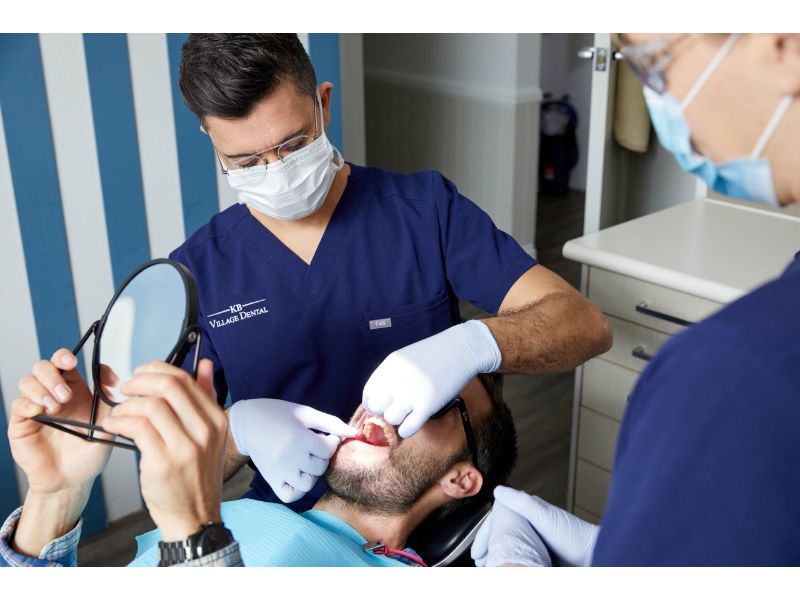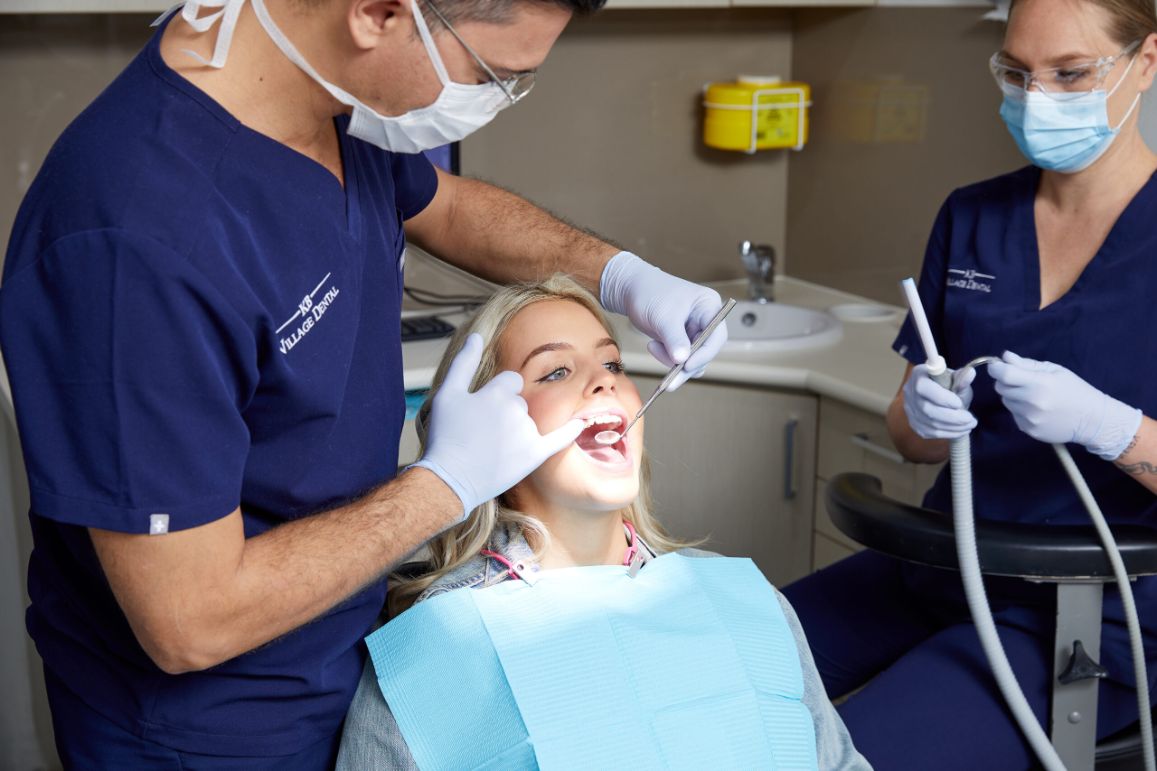How Do I Know if I Have a Cavity? Tips from a Sydney Dentist
Are you or your loved ones experiencing discomfort or tooth pain and wondering what the cause could be? While a trip to the dentist may seem time-consuming or scary, the truth is, if you have a cavity, it’s better to have it taken care of sooner rather than later. You may not always be aware that a cavity exists, and waiting until you develop symptoms only means the situation is worsening; thus, visiting your dentist regularly will ensure you get to it when it is small and less costly to treat.
This article will explain some of the tell-tale signs of a cavity and help you understand how dentists treat them. We’ll also give you tips on your daily habits that can help you avoid cavities in the future.
How do I know if I have a cavity?

The only way you’ll know for sure that you have a cavity is to visit your dentist. However, there are some common signs of a cavity that you can look out for. It’s important to be aware of the signs and symptoms, as it’s always better to catch a cavity in the early stages.
Common signs and symptoms of a cavity
- Toothache. Whether it’s a constant ache or a sharp pain that comes and goes suddenly.
- Tooth sensitivity. It could be a specific spot or difficult to pinpoint the location of the sensitivity.
- Visible holes in your teeth.
- Mild or sharp pain when eating food or drinking something hot or cold. Sweet foods like soda or lollies can also bring on pain.
- Discolouration, such as brown, black or white stains and/or spots on the surface of your teeth.
- Sore or painful gums.
- Pain when you bite or chew.
- Bad breath that doesn’t go away with brushing, mouthwash or flossing.
- A swollen face.
If you’re experiencing any of the above, we recommend making an appointment with your dentist as soon as possible.
What is a cavity?
You may have heard the terms ‘cavity’ and ‘tooth decay’, and although the terms are often used interchangeably, they’re actually two different things. A cavity is the hole that develops in your tooth because of the tooth decay. Along with affecting the appearance of your smile, a cavity can become a painful condition that will only get worse if not treated by a dentist.
What causes cavities?
Cavities are caused by the plaque (bacteria) in your mouth feeding on food particles, turning the plaque into an acid which decays the tooth enamel. A cavity will gradually affect all layers of the tooth, starting with enamel (the outer layer of the tooth), then the dentine (middle layer), and finally the pulp (the inner layer containing the nerves and blood vessels). Symptoms develop as the bacteria spreads into the deeper layers.
What habits can lead to a cavity?

No one deliberately sets out to get a cavity, however, poor dental hygiene habits will greatly increase your risk of tooth decay. Everyone, including children and adults, are at risk of cavities. This is why it’s important for both you and your children to routinely get your teeth checked and cleaned by your local family dentist.
Additional risk factors that can increase your chances of getting a dental cavity include:
- Eating sugary foods. Lollies, sugary snacks, soft drinks, ice cream, milk and cereal are all examples of food that encourage more dental plaque that can easily become tooth decay.
- Poor tooth brushing habits. This includes not brushing enough, or a poor technique that doesn’t clean your teeth properly.
- Lack of fluoride. This mineral helps prevent cavities and can be found in toothpaste, mouthwash, and some tap water.
- Dry mouth. Saliva plays an important role in washing away bacteria and plaque. If your mouth isn’t producing enough saliva due to dehydration or other health conditions, it increases your risk of cavities.
- Eating disorders. Frequent vomiting exposes your teeth to stomach acid that will eventually erode enamel.
- Acid reflux. Another condition that frequently exposes your teeth to stomach acid, eroding the enamel and increasing your risk of cavities.
How are cavities treated?
The treatment your dentist recommends will depend on the extent of your cavity. Your dentist will do an exam and likely take an x-ray to check between your teeth to determine the best course of action. An x-ray is required as cavities are commonly hidden and not able to be detected just by looking in the mouth.
Treatments a dentist may use for cavities

Fluoride Treatment
If there is tooth decay, but it hasn’t formed a cavity, a good hygiene clean and fluoride treatment may be all you need.
Fillings
If the cavity is small and not severe, your dentist will clean the decay and fill the hole with a filling.
Dental crowns
Crowns are for when your tooth is so decayed there’s little healthy enamel left. A dental crown will cover the damaged tooth, improving its strength and appearance.
If you’re considering whether or not dental crowns are right for you, learn more here.
Root canal
Dental root canals are for when the decay has reached the pulp and root of your tooth. Along with removing the decayed parts of the tooth, a root canal involves removing blood vessels, tissue and the tooth’s nerve. A sealing material is then used to fill the root. It’s common for a crown to be needed in addition to a root canal. A dental crown is then required (as above).
Tooth removal
If the damage or infection is severe, there may be no option but to remove the tooth completely. Tooth replacement options can include dental implants, a bridge or dentures.
Home remedies for cavity pain
Until you attend your appointment, here are a few home remedies you can try to ease the pain of a cavity. (NB: To be clear, these won’t fix your cavities, rather they will help ease your pain until you see your dentist.)
- Use toothpaste designed for sensitive teeth.
- Avoid overly hot, cold or sweet food and beverages.
- Use over-the-counter painkillers like Panadol or Nurofen or a combination of both (if safe for you to do so).
Can cavities be reversed?
For mild tooth decay that has not turned into a cavity, it is possible to stop the damage without needing a filling through brushing and good dental care. Regular hygiene appointments with your dentist can assist in reducing plaque and resulting tooth decay. Once your tooth decay has reached the stage where you have a cavity, it cannot be reversed and needs to be treated by professionals.
Your dentist will recommend the best course of action at your appointment. If you have mild tooth decay that doesn’t yet require filling, regular check-ups are imperative so that your dentist can keep a close eye on it to ensure the decay doesn’t progress.
What are the complications of cavities?
A cavity may not seem like a big deal, but ignoring one is a risky gamble. Left untreated, a cavity will only get worse and could lead to much bigger problems that could damage your gums and nerves and lead to a major infection that can leave you sick and with facial swelling.
Some of the complications you’ll face leaving a cavity untreated include:
- Worsening pain.
- Severe, sometimes irreversible, tooth damage.
- Difficulty chewing.
- Development of an abscess (a pocket of pus beneath the tooth), which, in severe cases can block airways and potentially be life-threatening.
- Loss of a tooth that could’ve been saved.
How can I prevent cavities?

It’s much better to avoid getting cavities through prevention than trying to treat them. With that in mind, the benefits of good, oral hygiene can’t be overstated. Through good daily dental care, you give your teeth the best chance of remaining in good health and free of cavities.
7 steps to include in your dental hygiene routine
- Brush your teeth. You should do this twice a day, using a soft, quality toothbrush and fluoride toothpaste.
- Floss. Flossing should be done daily, reaching down between the teeth into the gum line (bleeding gums when you floss is often a sign you have unhealthy gums and need to floss more often).
- Practice complete oral hygiene. Looking after your gums, tongue and mouth will help keep your teeth nice and healthy.
- Eat a balanced diet. Minimise food and beverages that are full of sugar and be sure to drink plenty of water.
- Minimise snacking. We all snack from time to time, but it provides more chances for food to cling to our teeth and form harmful bacteria.
- Visit your dentist for regular dental hygiene check-ups and cleans. Visits to your dentist are the best way to catch any dental issue early. Your dentist may also spot any problem areas in your daily routine and help you correct them.
- Teach your kids healthy dental habits. It’s important for kids to learn good daily dental habits to prevent cavities later on.
Whether you have cavity signs or not, you and your family need to have regular check-ups and hygiene appointments with a dentist.
Check-ups allow you and your dentist to stay on top of any potential gum, mouth or tooth problems. A professional clean will remove any plaque and help you avoid more serious problems down the track. They’ll also detect early warning signs of other dental diseases such as gingivitis.
Need a trustworthy dentist in North Sydney?
KB Village Dental is here for all your dentistry needs in Sydney.
Whether you need emergency dentistry or just a routine check-up, our friendly team will look after your entire family.
For more information or to book your next appointment, head to our contact page and send us a message or give us a ring.

